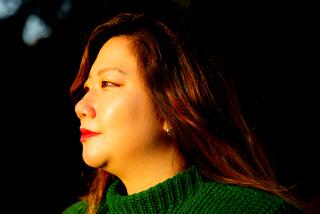Middle-Class in a Maoist Maelstrom : WILD SWANS Three Daughters of China, <i> By Jung Chang</i> , <i> (Simon & Schuster: $25; 503 pp., illustrated) </i>
- Share via
This real-life saga of a Chinese family over three generations contains more domestic drama than “Dynasty,” more violence than any film noir, more heart-rending tragedy than “Little Dorrit” and more ironic twists and turns and villains on the make than any Balzacian fresco.
It is the tale of Jung Chang’s grandmother, the beautiful Yu-fang, “sold” as a concubine to a Chinese warlord in 1924 at the age of 15; of her high-spirited mother, Bao Quin, who worked underground for the communists while still a schoolgirl in “Manchukuo” at the close of World War II; and finally of herself, ex-Red Guard, ex-”barefoot doctor” and secret Mao-hater, educated in the best schools for the privileged children of high-ranking communists and now, in her 30s, living and teaching in London.
Drawing from her memories and those of surviving family members, Jung Chang vividly evokes China’s sights, sounds and smells to create what must be one of the grimmest, yet most perceptive accounts of growing up middle-class in the maelstrom that has swept China since the 1920s. Almost casually, Jung Chang introduces us to a world where personal insecurity, sudden ruin and the possibility of torture and violent death are as perfunctorily taken for granted as tomorrow’s thunderstorm.
The story begins in Manchuria. Probably the most nightmarish Chinese province to grow up in, it had been invaded and pillaged by the Japanese, the Russians, the Kuomingtang, and finally by Chinese communists taking revenge on real and imagined “collaborators.” Bao Quin was one of the neatly dressed schoolgirls chosen to hand bouquets to Pu Yi, the emperor of Manchukuo (the puppet state created by the Japanese) and previously China’s “last emperor.”
Even though most of Bao Quin’s friends were from families opposed to Pu Yi and loyal to China’s National People’s Party, the Kuomintang, and even though Bao Quin herself had fought heroically against the Japanese from the age of 16 on, she eventually became suspect to China’s grotesque party cadres, conspiracy theorists who were perennially searching for “quotas” of “rightists” and traitors in their midst.
Early in “Wild Swans” is a clinical description of the way “grand-mother” Yu-fang’s feet were bound, when she was a baby girl, to indulge the erotic fantasies of her future lord and master. It is impossible not to see, in this gratuitous and excruciating example of human cruelty, a microcosm of China’s own propensity for self-inflicted wounds: the absence of any rule of law, the fatalistic attitude toward corruption, the acceptance of religious and social conventions that turned concubines into slaves and harpies (and compelled Manchu wives to rise at 3 a.m. to prepare different entrees for each of their family’s segregated groups), the observance of arbitrary customs sanctified only by time--and, later, the most costly self-inflicted injury of all: China’s enthusiastic surrender to Maoism, grafted onto the ancient evils and leading, over the next four decades, to more than 50 million deaths.
The period covered by Jung Chang already has been the subject of many first-rate academic studies, but there never has been a book like this. Here, family and political histories interweave. In the years before the Japanese occupation, Yu-fang becomes a virtual prisoner of her warlord “husband” (an ally of the notorious “Christian general”) who keeps her in a gilded cage under the constant surveillance of predatory servants ready to do anything to gain his favor. She shares his bed for six days, then he disappears without trace for six years, only to return without warning or explanation to father her child.
Summoned with her baby daughter to join his household at the time of the warlord’s death, she finds his palace in an uproar, with rival wives and concubines all plotting intrigues against each other, and planning escapes, at considerable risk. But family life, even after her remarriage to a saintly doctor, proves just as terrifying: The doctor’s concubines, and sons by a previous marriage, gang up on her, forcing her and her husband to abandon all their worldly goods and leave town.
Yu-fang’s own father is a male chauvinist of almost mind-boggling proportion, selling her to the warlord in the first place not only to improve the status of the family but also to buy himself more concubines. A popular Chinese dictum was that all women had “long hair and short intelligence,” but the lives of these these three generations of women are powerful evidence to the contrary: They were resourceful, immensely brave and, above all, survivors.
Not many men in their lives, in contrast, passed muster. Even the author’s father, Yang Yu, the epitome of young, principled communist probity, is at times insufferably smug, indifferent to his wife’s feelings, comfort or dignity in his abject need to conform to rigid narrow-minded Party rules. Significantly, Yu-fang originally voices her disapproval when her daughter starts dating him not because he is a communist, but because he is an official, and “there is no official who is not corrupt.”
Jung Chang’s parents were exceptional for their probity. During the “Great Leap Forward,” her father almost starved to death rather than use his cadre’s prerogatives and privileged food supplies. Her mother, Bao Quin, was both predator and victim: Even as she hunted down “capitalists” and profiteers in her husband’s Sichuan district, she was undergoing constant interrogation about her “Manchukuo” past--confined, at night, to a detention camp and completely cut off from her family for six months before her final rehabilitation. Later, her parents became high-ranking Party members in Chengdu; Jung Chang gives us a fascinating glimpse of their lives of vice-regal, “country club” splendor inside a highly segregated, luxurious compound, accessible only to the tiny, highly stratified local Communist elite.
Nemesis comes with the “Cultural Revolution.” Suicidally appealing to Mao himself to stop the insane movement, her father promptly is incarcerated and tortured. He goes mad, while her mother is locked up, beaten and humiliated, dressed up in a “dunce cap” and exhibited to jeering crowds of Red Guards. Both are victims, not just of youthful Red Guard hooligans but also of an abominable couple of Maoist functionaries, the Tings, who side with the Red Guards to reinforce their local prerogatives, and prove as evil, and as ruthless, as any pre-revolutionary warlords.
Both the author and her parents emerge from the “cultrev” completely broken, their lives in ruins, sustained only by their love for each other. In 1978, fulfilling a long-prepared plan, Jung Chang, a brilliant English student, leaves China for good on a coveted scholarship.
Perhaps this massive book’s only failing--and it is a minor one--is its attempt to chronicle the Cultural Revolution both as history and as personal experience: A whole body of “Red Guard” literature (and Nien Cheng’s “Life and Death in Shanghai”) has familiarized us with those horrendous years, and I impatiently scanned the pages dealing with the “tick-tock” leading up to the cultrev. I was eager to return to the town of Chengdu, to Jung Chang and her amazing family.
More to Read
Only good movies
Get the Indie Focus newsletter, Mark Olsen's weekly guide to the world of cinema.
You may occasionally receive promotional content from the Los Angeles Times.










